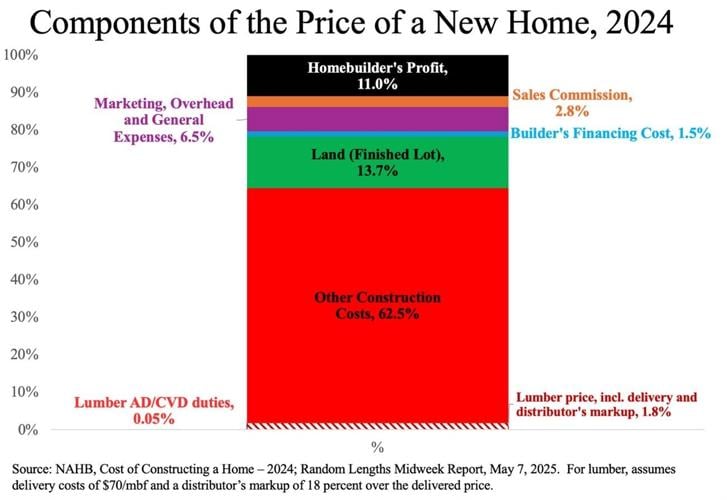WASHINGTON, July 29, 2025 /PRNewswire/ -- The U.S. Department of Commerce recently announced an antidumping duty rate of 20.56 percent in the sixth annual antidumping review of unfairly traded Canadian softwood lumber imports into the United States. The review establishes a liability rate for lumber imports that were dumped by Canadian companies into the U.S. market in calendar year 2023.
A number of organizations and individuals in Canada who have a long history of strongly advocating for Canadian industry – such as the BC Lumber Trade Council (BCLTC), the BC Council of Forest Industries (COFI), British Columbia Forest Minister Parmar, and B.C.-based industry analysts such as Russ Taylor – have made statements about the increased dumping rate. These statements continue to ignore the fact that the dumping rate went up because Canada intensified its unfair trading behavior – simple as that.
These Canadian statements demonstrate a complete misunderstanding of the U.S. trade laws (which are very similar to Canadian trade laws), while continuing to regurgitate misinformation along with Canada First allies in the United States such as the National Association of Homebuilders (NAHB). These advocates for the Canadian industry are ignoring some very basic fundamental facts as they struggle to justify Canada's continued unfair trade practices, which includes harmful dumping fueled by Canada's massive excess lumber production capacity of 8 billion board feet. It seems clear that there is a sense of panic in Canada as the bill for its 2023 unfair trade practices is coming due to the tune of at least $1 billion dollars – money owed to U.S. taxpayers as a consequence of Canada's worsening dumping and subsidy behavior.
The U.S. Lumber Coalition offers the following observations and reactions to the broad range of Canadian statements regarding the recent findings of the U.S. Department of Commerce.
Canada ignores the fact that it engages in unfair trade and that antidumping and countervailing duty deposit rates are simply a reflection of Canadian unfair trade behavior: "We have said it before, and we say it again: If Canada does not like paying antidumping and countervailing duties, then stop dumping lumber into the U.S. market and stop subsidizing your industry," stated Zoltan van Heyningen, Executive Director of the U.S. Lumber Coalition. "It is remarkable that everyone advocating for Canadian industry, including Canadian industry associations, industry talking heads like Russ Taylor, and provincial government officials, ignores the fact that the U.S. Department of Commerce has determined that the Canadian lumber industry is engaging in unfair trade practices, and that the U.S. International Trade Commission has determined repeatedly that Canada's unfair trade practices are harming U.S. lumber producers and suppressing the continued natural growth of the U.S. industry."
"Duties are rising because the Canadian industry intensified its dumping to the detriment of U.S. industry, workers, and communities. The United States didn't ask for Canada to engage in unfair trade, and the increased duties are the sole responsibility of Canada," added van Heyningen.
Canadian industry, government officials, and Mr. Russ Taylor call antidumping and countervailing duties unjustified and punitive: "Antidumping and countervailing duties result from an in-depth investigation of facts by the U.S. Department of Commerce. They simply offset the levels of unfair trade and subsidies received by Canadian producers, nothing more. Unfair trade is extremely harmful to U.S. producers, U.S. workers, and their communities. As such, they are absolutely justified, and there is nothing punitive about leveling the playing field against such unfair trade practices," stated van Heyningen.
Canadian officials, such as BC Forest Minister Ravi Parmar, have a fundamental misunderstanding of the U.S. trade laws, and instead focus on political rhetoric and advancing misinformation: "BC Forest Minister Parmar has demonstrated yet again an incredible lack of understanding of even the most basic facts around the trade case against Canadian lumber imports," stated van Heyningen. "Mr. Parmar seems more focused on the politics of the trade case issue instead of trying to actually understand the facts, all while feigning concern for U.S. consumers based on spurious numbers in a desperate attempt to appear responsive to the situation on the ground. "An increased cost of 15,000 to 20,000 more U.S. dollars to purchase or build a home in the United States? Really Mr. Parmar? Please do show us the math for that. I think even Canadian allies like the NAHB would not go this far with their already outrageous claims. These types of unfounded scare tactics have grown old and tired, and are simply not credible," concluded van Heyningen.
Despite massive softwood lumber excess capacity problems in Canada and British Columbia, the B.C. industry is calling for government aid to further increase that harmful excess capacity: "Canada has a strong sense of entitlement to maintaining access to the U.S. market for its massive excess lumber capacity," stated Andrew Miller, Chair/Owner of Stimson Lumber Company and Chairman of the U.S. Lumber Coalition. "For the B.C. industry to call for provincial government help to further increase unneeded softwood lumber production in British Columbia when their excess lumber capacity and production is already not needed and causing serious harm to U.S. producers just comes across as incredibly tone deaf. So let me be crystal clear: Canada, we do not need your dumped and subsidized excess lumber," exclaimed Miller.
Canada denies subsidizing its softwood lumber industry while simultaneously asking for more subsidies: "Canadian industry and government officials continue to call for more new subsidies while simultaneously claiming that the Canadian softwood lumber industry is not subsidized," stated van Heyningen. "There seems to be a real disconnect in Canada in understanding that these positions cannot be reconciled. Perhaps this conflict of statements and claims by Canada will become more obvious once the U.S. Department of Commerce releases its final determination for the sixth administrative review in the countervailing duty case," added van Heyningen.
Messrs. Russ Taylor and David Elstone published an opinion piece highlighting their inability to consider all facts as they strongly advocate for the interests of the B.C. lumber industry: "Messrs. Taylor and Elstone recently issued an opinion piece in which Taylor stated that 'as industry consultants based in British Columbia, Canada,' they felt compelled to attempt to correct the record regarding statements made by the U.S. Lumber Coalition. Mr. Taylor correctly identified himself and Mr. Elstone as B.C.-based consultants, and, as such, his conclusions regarding this matter are no surprise," stated van Heyningen. "Unfortunately, yet perhaps predictably based on Mr. Taylor's past statements regarding this issue, instead of presenting 'a more accurate assessment of the US and Canada softwood lumber situation,' Mr. Taylor's opinion piece ignores the most fundamental facts about Canada's excessive reliance on the U.S. market and the harm it causes to the U.S. softwood lumber industry, while ironically highlighting the fact that the antidumping and countervailing duty orders have been extremely effective in reducing the harm of unfair trade."
Andrew Miller concluded, "the arrogance and attitude of entitlement among Canadian lumber producers and government officials about access to the United States as a dumping ground for their excess capacity and the U.S. response of simply enforcing its trade laws to protects its citizens and communities from foreign unfair trade is astounding. Canadian industry and political leaders are in effect saying, 'the United States should not enforce its trade laws on behalf of its citizens and communities but should instead allow Canada to dump its lumber into our market to protect and benefit Canadian workers and communities.' Canada feels entitled to our market. It is not."
"We applaud President Trump for firmly enforcing our trade laws against all unfair trade, including against unfairly traded Canadian lumber imports. This commitment to enforcing our trade laws not only saves American jobs but also will continue to build up the U.S. lumber industry and allow it to grow to its natural size to supply the American market with American product," added Miller.
More Information
U.S. lumber industry and workers sent a letter to President Trump on the need for continued strong enforcement of the U.S. trade laws to keep expanding U.S. lumber manufacturing and availability to build more American homes with American lumber. https://uslumbercoalition.org/story/u-s-lumber-industry-and-workers-letter-to-president-trump/
Enforcing U.S. trade laws helps increase the U.S. supply of lumber to build American homes, all without impacting the cost of a new home, as demonstrated by data from the National Association of Home Builders (NAHB) and Fastmarkets Random Lengths.
About the U.S. Lumber Coalition
The U.S. Lumber Coalition is an alliance of large and small softwood lumber producers from around the country, joined by their employees and woodland owners, working to address Canada's unfair lumber trade practices. Our goal is to serve as the voice of the American lumber community and effectively address Canada's unfair softwood lumber trade practices. The Coalition supports the full enforcement of the U.S. trade laws to allow the U.S. industry to invest and grow to its natural size without being impaired by unfairly traded imports. Continued full enforcement of the U.S. trade laws will strengthen domestic supply lines by maximizing long-term domestic production and lumber availability produced by U.S. workers to build U.S. homes. For more information, please visit the Coalition's website at www.uslumbercoalition.org.
CONTACT: Zoltan van Heyningen
zoltan@uslumbercoalition.org | 202-805-9133
![]() View original content to download multimedia:https://www.prnewswire.com/news-releases/us-lumber-coalition-comments-on-canadian-reaction-to-us-trade-law-enforcement-302516523.html
View original content to download multimedia:https://www.prnewswire.com/news-releases/us-lumber-coalition-comments-on-canadian-reaction-to-us-trade-law-enforcement-302516523.html
SOURCE U.S. Lumber Coalition






